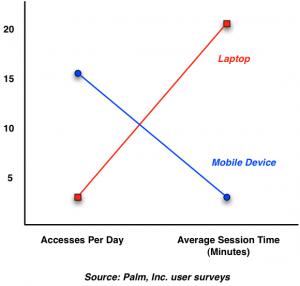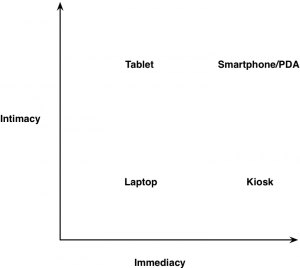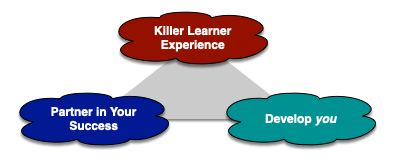I’ve been wrestling with the difference between the smartphone (or PDA, aka the ‘pod’) versus a tablet (aka the ‘pad’), and it occurred to me that one way to think about it might be to distinguish between ‘intimacy’ and ‘immediacy’.
 By immediacy, I’m talking about how you use the devices. As Palm documented a long time ago, you use laptops only a few times per day, but for long periods of time. Whereas you use mobile devices many times a day for quick access. Tablets are actually more used like laptops in this respect. You don’t tend to whip your tablet out, answer a quick question, and put it away. The size tends to make it awkward to whip in and out, and instead is more amenable to using for a period of time. Of course, smaller tablets may bridge the gap.
By immediacy, I’m talking about how you use the devices. As Palm documented a long time ago, you use laptops only a few times per day, but for long periods of time. Whereas you use mobile devices many times a day for quick access. Tablets are actually more used like laptops in this respect. You don’t tend to whip your tablet out, answer a quick question, and put it away. The size tends to make it awkward to whip in and out, and instead is more amenable to using for a period of time. Of course, smaller tablets may bridge the gap.
By intimacy, I mean the relationship to the device. As Judy Brown defines a mobile device, it’s small enough to fit in your pocket, has a battery to last all day, and you really know it. I’m particularly picking up on the latter, and moreover, that you can customize it. David Pogue has opined that it’s not really the smartphone that matters, but rather the ‘app phone’, and I think it’s important that you can optimize the device by loading it with capabilities that accessorize your brain. Though you can add ringtones, and even some apps (via, for instance, Brew), it’s much harder to augment your capabilities without a rich market of differentiated programs.
There’s more. For one, the smaller screen means you have the device closer. Laptops are inherently at arms length (or at least forearm’s length), to effectively use a keyboard. The smaller screen of a mobile device invites it closer, as does the small keyboard, using thumbs instead of the whole hand. A touchscreen interface also invites a different relationship.
 This gives me a framework for distinguishing between the devices. A laptop, even if customized by your applications, isn’t intimate, and by size isn’t used with immediacy. Tablets are intimate, but not immediate. Smartphones are intimate and immediate. Finally, there’s the category of immediate but not intimate. This might be the use of a touchscreen kiosk you find at a public spot or in a museum, or perhaps also using someone else’s device for a quick access.
This gives me a framework for distinguishing between the devices. A laptop, even if customized by your applications, isn’t intimate, and by size isn’t used with immediacy. Tablets are intimate, but not immediate. Smartphones are intimate and immediate. Finally, there’s the category of immediate but not intimate. This might be the use of a touchscreen kiosk you find at a public spot or in a museum, or perhaps also using someone else’s device for a quick access.
This seems to give me a handle on thinking about the differences between tablets and smartphones & PDAs (I think the iPod touch is a great device, say for kids in schools). Does it work for you?
 An absolutely killer learning experience
An absolutely killer learning experience